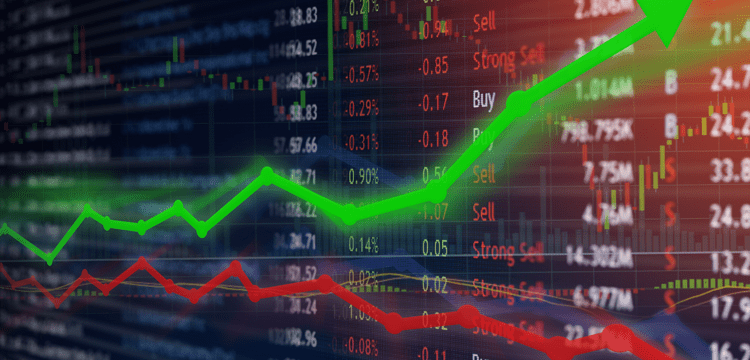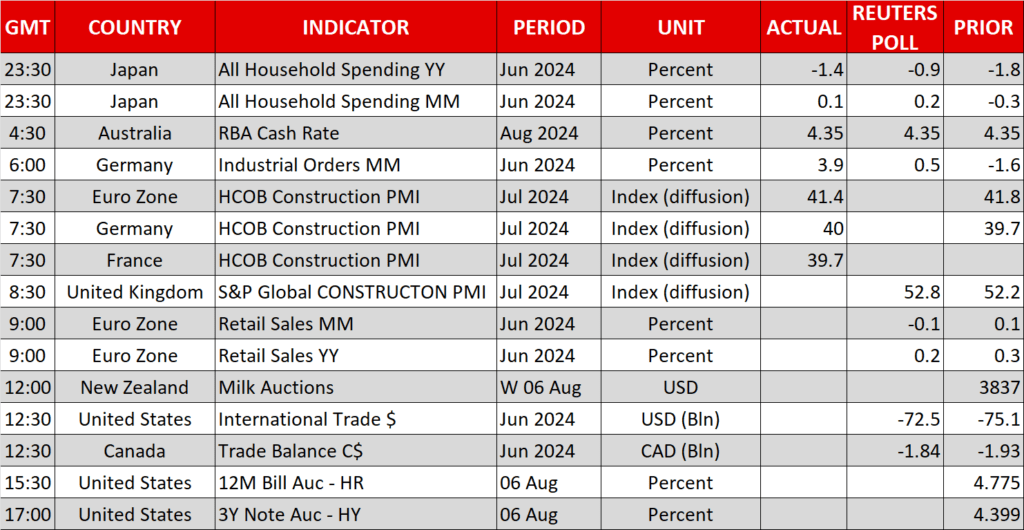
- Slightly more positive tone in equity markets today
- Fear of recession fuels Fed rate cut expectations
- Light calendar today, focus on data during the Asian session
- RBA remains hawkish, considers a rate hike

US stock markets set the tone for recovery
With the US stock markets recovering slightly yesterday, the overall market sentiment is more positive today. After three disastrous sessions, the Nikkei 225 equity index is in the green at the time of writing, partly assisted by the strong labour cash-earning data, and bitcoin is hovering well above yesterday’s lows.
There has been a lot of analysis about the aggressive correction in the Japanese stock markets and the unwinding of Japanese carry trades causing the latest widespread market panic. These have definitely played a key role, but they do not explain the underperformance of the US dollar. Typically, in periods of market angst, the dollar is the primary beneficiary due to safe-haven flows. That did not take place this time around with the euro managing to quickly climb close to $1.10 despite the continued negative newsflow from the eurozone.
Friday’s weaker US labour market report was also blamed for the acute market reaction but as the Fed’s Daly commented overnight “the labour market is slowing but not falling off a cliff”. She even added some colour to Friday’s print by stating that “the July jobs report reflected a lot of temporary layoffs, hurricane effect” in an obvious attempt to negate fears about a US recession.
Fed’s Daly commented overnight that “the labour market is slowing but not falling off a cliff”.
The last two recessions in the US coincided with significant events like the COVID-19 pandemic (2020) and the subprime mortgage crisis in 2008. Interestingly, certain market participants may be trying to make a connection between the 2000 dot-com bubble and the current AI frenzy. This comparison has merit but again a one-off event, the tragic September 11, 2001 attacks, played a key role in pushing the US into recession in 2001.
Certain market participants may be trying to make a connection between the 2000 dot-com bubble and the current AI frenzy
The end-product of the last few sessions is that the market is now expecting 110bps of easing by the Fed by year-end with some famous economists talking about a 50bps rate cut in September. Considering that two weeks ago the debate was on whether the Fed could cut ahead of the November Presidential election, the market is probably running ahead of itself. Aggressive easing by the Fed is usually associated with significant, one-off events; barring such a development, the current US data has to dramatically deteriorate over the next 40 days to justify such a reaction.
Light calendar today
The market usually needs fresh newsflow, particularly key data releases, to digest and reassess its current thinking. The calendar is rather light across the board today and, considering the absence of any Fed speakers, the possibility of another sea of red in equities is high. Interestingly, gold continues to experience strong volatility and is hovering around the $2,400 level.
Asia-Pacific region in focus again
Despite the aggressive repricing of Fed rate cut expectations, the RBA opted to stay vigilant to upside risks to inflation at today’s meeting, ignoring some marginal calls for a more dovish stance. In fact, RBA Governor Bullock commented that a rate hike was considered today and that “a rate cut is not on the agenda in the near term”, thus pouring cold water on expectations for RBA rate cuts during 2024.
RBA Governor Bullock commented that a rate hike was considered today and that “a rate cut is not on the agenda in the near term”
Key data will be published during the Asian session in both New Zealand and China. The RBNZ is preparing for its August 14 meeting and hence a negative set of labour market data could open the door to a dovish shift. This shift, to a certain extent, depends on China where the administration is still trying to solve the housing sector puzzle.

Source by: XM Global

